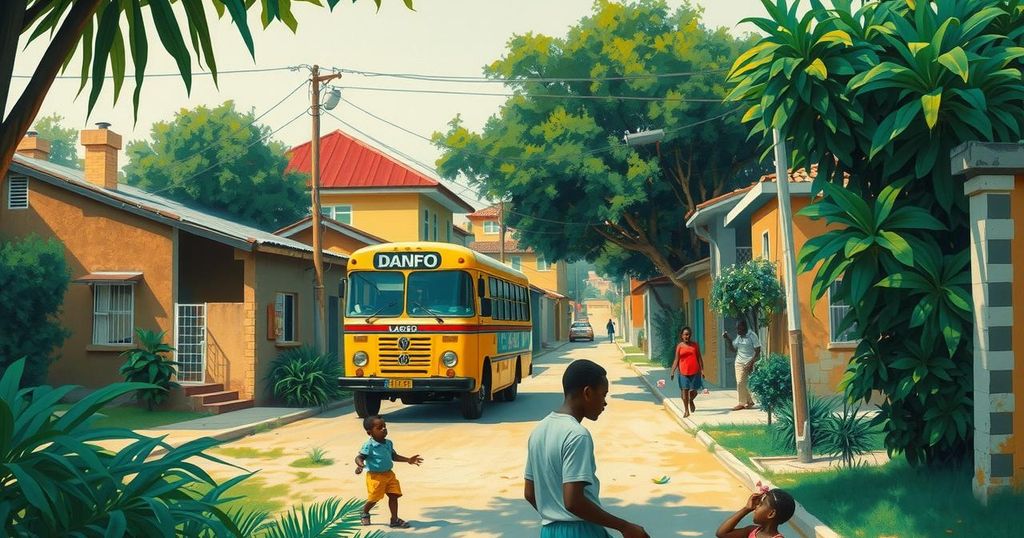‘My Father’s Shadow’: A Historic and Poignant Insight into Lagos Politics

Akinola Davies Jr.’s *My Father’s Shadow*, the first Nigerian film at Cannes, explores a pivotal election day in 1993 Lagos through the eyes of two brothers. Balancing themes of father-son relationships and national turmoil, the film captures personal struggles amid political unrest, garnering critical acclaim for its artistic storytelling.
Akinola Davies Jr.’s debut film, My Father’s Shadow, marks a historic moment as the first Nigerian film showcased at Cannes, specifically in the Un Certain Regard category. Set against the backdrop of Nigeria’s pivotal June 12, 1993 election, the movie encapsulates a nation brimming with anticipation for change. Following two brothers, Akin and Remi, on this significant day, the film deftly balances themes of politics and familial relationships amid the oppressive heat of Lagos.
The film opens with an intimate lens, drawing viewers into the brothers’ world as they address mundane sibling squabbles, maintaining a childlike innocence. The cinematographic style resembles other contemporary works, blending lyrical visuals with understated nods to the influences of Black filmmakers like Julie Dash. The soundscape—the buzzing of flies, rustling leaves—sets a poetic atmosphere over the everyday reality of the boys’ lives.
A dramatic shift occurs when the brothers encounter their father, Folarian, portrayed by Sopé Dirisu, who emanates a distant, intimidating aura. The tense moment of his interrogation about a missing watch highlights the emotional disconnection within their relationship. This marks the beginning of Folarian’s unexpected adventure with Akin and Remi, as they navigate Lagos and their father’s past.
As they embark on their journey, Folarian’s attempt to strengthen his bond with his sons includes riding a danfo, a local bus. The vibrant scenes of the city come alive, laden with characters sharing gossip and political discourse, which abruptly contrasts their rural existence. This lively atmosphere also introduces the boys to harsh realities, including discussions of military violence that underscore the political stakes of the day.
While weaving through Lagos, Akin and Remi are treated to stories from their father’s friends, offering glimpses of Folarian’s younger days. The nonlinear storytelling can feel somewhat fragmented, leaving viewers craving deeper insights into the characters. Nevertheless, the film excels in its quieter, personal moments, delivering heartfelt encounters that are relatable despite some overly sentimental dialogue.
Folarian is portrayed as a man in conflict—torn between personal duties and hidden political tensions. Dirisu’s nuanced performance reveals layers of conflict beneath the surface. First-time actors Chimerie and Marvellous Egbo capture the complexities of sibling dynamics, oscillating between affection and rejection toward their father.
As the day unfolds, the narrative shifts to a more urgent tone as election results lead to chaos in Lagos. The impending curfew and military presence heighten the sense of dread. Folarian’s desperation to return home with his sons mirrors the nation’s escalating turmoil, culminating in a violent outbreak.
Davies Jr. encapsulates the atmospheric tension with sharp editing that elevates the emotional stakes, drawing parallels between the family’s struggles and the nation’s disillusionment. In reflecting on this pivotal moment in Nigerian history, My Father’s Shadow powerfully interlaces personal grief and a broader national trauma, showcasing Davies Jr.’s promise as a filmmaker in his impressive debut.
This artistry positions the film as a deeply thoughtful exploration of father-son relationships amid a politically charged backdrop, ensuring its place not just in Nigersian cinema but within the global narrative as well.
*My Father’s Shadow* presents a touching narrative that artfully blends personal and political dimensions, capturing a significant day in Nigerian history through the lens of a family’s complexity. Akinola Davies Jr.’s unique storytelling and visual style invite audiences to reflect on the intertwining fates of individuals and their nation, showcasing the potential of Nigerian cinema on an international stage. As the first Nigerian film presented at Cannes, this film extends its significance beyond mere entertainment, asking us to consider the emotional weight of our collective histories.
Original Source: www.hollywoodreporter.com







